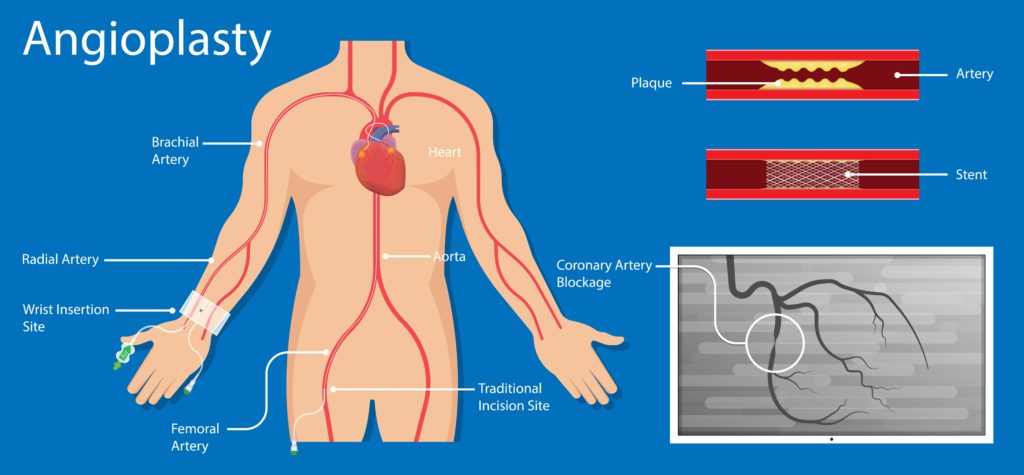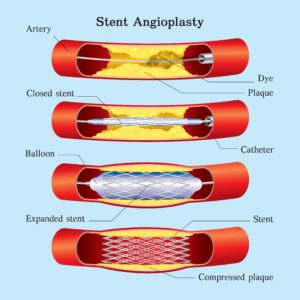
What are cardiovascular catheterization & electrophysiology labs?
Cardiovascular catheterization & electrophysiology laboratories are specialized hospital units where cardiovascular diseases are diagnosed and treated in a minimally invasive manner with the help of diagnostic imaging equipment.
The cardiac catheterization lab (or cath lab) is where diagnostic procedures are performed to visualize the arteries and chambers of the heart to treat narrowing of blood vessels (stenosis) or other abnormalities.
When coronary artery disease causes chest pain or a heart attack, percutaneous coronary artery intervention is performed by inserting a catheter through the artery of the groin or arm, visualizing the narrowing or blockage, and restoring normal flow with a balloon or stent.
Other critical procedures are also done in the cath lab to assess the vessels, valves, and muscle of the heart. Mather Hospital’s new cath lab offers patients the convenience of having scheduled cardiac procedures and if necessary, tend to their emergent needs.
The electrophysiology lab is where patients are treated for fast and slow heart rhythm disorders. Electrical testing on the heart (called an electrophysiology study, or EP study for short) can also be performed.
Slow heart rhythm disorders are frequently treated with pacemakers. At Mather, physicians utilize novel pacing technology including leadless pacing and conduction system pacing. Device therapies for arrhythmia disorders also include implantable cardioverter defibrillators (ICD) and implantable loop recorders (ILR).
Fast heart rhythms are often treated with a procedure called catheter ablation. This is where physicians use a catheter to freeze or cauterize abnormal tissue in the heart to stop abnormal heart rhythms.
The lab at Mather Hospital is prepared to treat a large range of heart disorders to provide high quality care locally. Plus, we’re an integral part of Northwell’s Cardiovascular Institute and connected to the wide network of services offered by Northwell Health.
Cardiac catheterization is a diagnostic procedure used to visualize the arteries and chambers of the heart and treat any narrowing of blood vessels (stenosis) or other abnormalities.

When coronary artery disease causes chest pain or a heart attack, percutaneous coronary artery intervention is performed by inserting a catheter through the artery of the groin or arm, visualizing the narrowing or blockage, and restoring normal flow with a balloon or stent.
Other critical procedures are also done in the cath lab to assess the vessels, valves, muscle, and electrical pathways of the heart. Mather Hospital’s new cath lab offers our patients the convenience of having scheduled cardiac procedures and if necessary, tend to their emergent needs.

Mather’s Cardiac Cath Lab is composed of two units – one for coronary diagnostic and intervention procedures. The second laboratory will also be able to do electrophysiology studies to assess the heart’s electrical system and will be used to diagnose and treat abnormal heartbeats or arrhythmias. This laboratory will be able to also perform a variety of procedures, including ablative therapies, device implants (pacemaker), cardioversions.
What does Mather’s cath lab provide?
Mather’s goal is to provide advanced cardiovascular diagnostic and interventional procedures. Every year patients that present to Mather Hospital with heart problems need to be transferred to other hospitals in the area to have these services elsewhere. Mather built a cardiac cath lab to provide high quality and faster care to those patients, especially those having a heart attack. Patients having a heart attack will be taken to the cath lab, where we can look for the artery that is closed and we can open it on the spot and restore blood flow to the heart and in that way prevent muscle damage.

